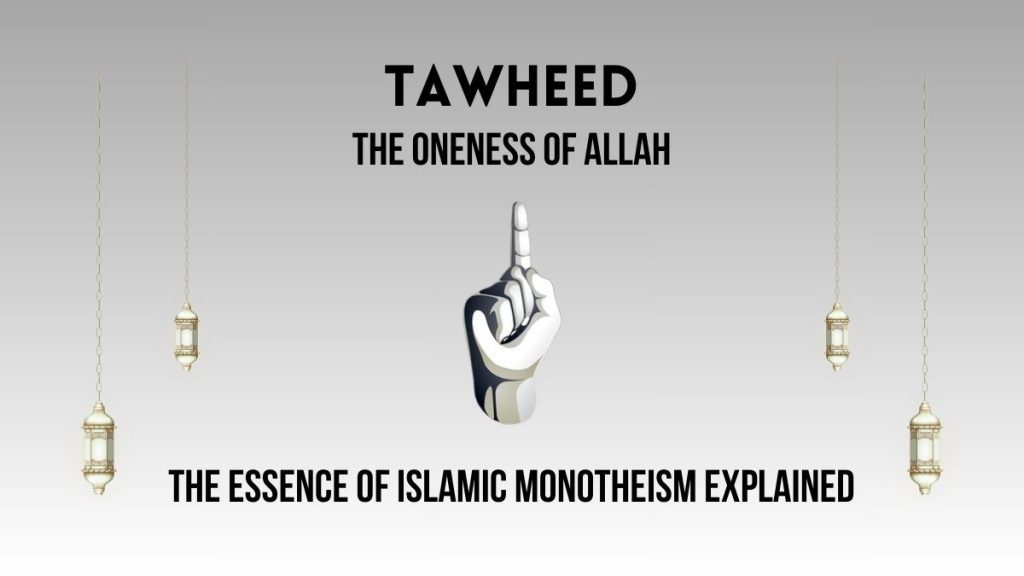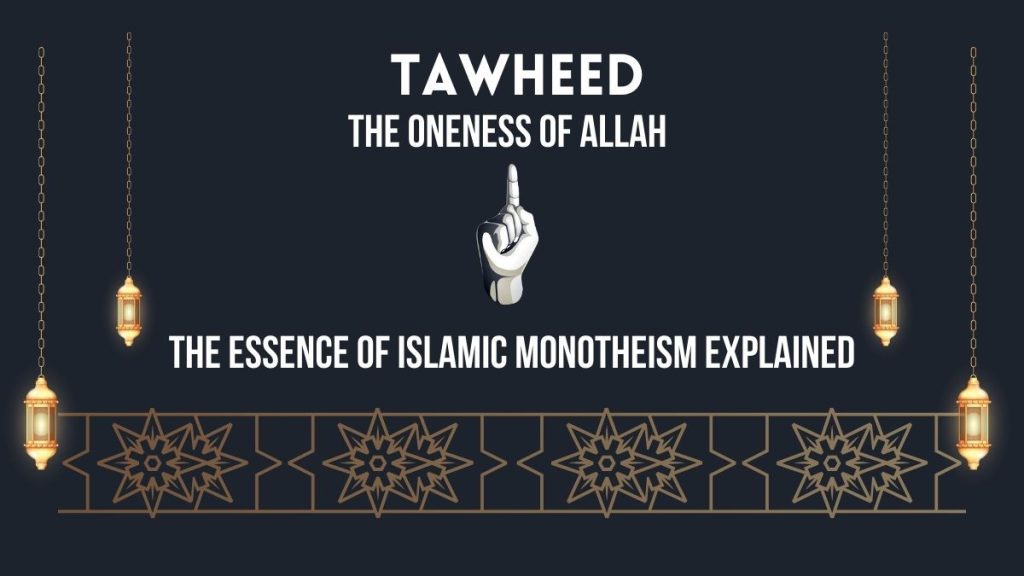*Tawheed* is the Islamic concept of monotheism, emphasizing the oneness of Allah. It signifies that Allah is singular, unique, and without partners.
Tawheed is the cornerstone of Islamic belief, shaping the faith’s core principles. It asserts Allah’s absolute oneness, rejecting any form of polytheism or idolatry. Believers see Allah as the sole creator and sustainer of the universe. This belief influences every aspect of a Muslim’s life, guiding their worship and daily actions.
Understanding Tawheed fosters a deeper spiritual connection and reinforces the commitment to living a life in accordance with Allah’s will. It is essential for anyone seeking to grasp the fundamentals of Islam and its profound emphasis on the unity and sovereignty of Allah.
Related Article: The Power of Islam: Unleashing its Transformational Potential

Related Article: How Does Islam Affect Daily Life: Unveiling the Impact
Concept Of Tawheed
The concept of Tawheed is central in Islam. It means the Oneness of God. Muslims believe in one God who is unique and supreme. Tawheed is the foundation of Islamic faith.
Oneness Of God
Oneness of God means Allah is the only deity. He has no partners. There is no one like Him. He alone deserves worship.
- Allah is the Creator.
- He is the Sustainer.
- He is the All-Powerful.
Belief in the Oneness of God shapes a Muslim’s life. It influences their thoughts, actions, and worship. Muslims say “La ilaha illallah”, meaning “There is no god but Allah”.
Attributes Of Allah
Attributes of Allah describe His nature. They show His greatness and majesty. Here are some key attributes:
| Attribute | Description |
|---|---|
| Al-Rahman | The Most Merciful |
| Al-Rahim | The Most Compassionate |
| Al-Malik | The King |
| Al-Quddus | The Pure |
Muslims often recite these names in prayers. They reflect on these attributes to understand Allah better. This strengthens their faith.
Related Article: Peace in Islam: Understanding its Amazing Transformational Power

Related Article: Unlocking the Power of Ummah Significance
Historical Background
Tawheed represents the fundamental concept of monotheism in Islam. Understanding its historical background is vital. This section explores its roots and evolution.
Pre-islamic Arabia
Pre-Islamic Arabia was a land of diverse beliefs. Most tribes practiced polytheism. They worshipped numerous deities and idols. The Kaaba in Mecca housed many of these idols. Tribal society revolved around these deities. Every tribe had its own gods and goddesses. This polytheistic belief influenced daily life and culture.
Despite this, some people believed in a single God. These individuals were called Hanifs. They followed the monotheistic belief of Abraham. Their influence, however, was limited. The majority continued idol worship.
Revelation To Prophet Muhammad
The revelation to Prophet Muhammad changed everything. In 610 CE, he received the first revelation. The angel Gabriel conveyed God’s message. This marked the beginning of Islam.
The core message was Tawhid, the oneness of God. Prophet Muhammad preached that there is no god but Allah. This message challenged the polytheistic beliefs of the time. He emphasized that Allah is the only creator and sustainer.
The revelations continued for 23 years. They were later compiled into the Quran. The Quran repeatedly stresses the importance of Tawhid. It is the foundation of Islamic faith.
The early Muslims faced persecution. The message of Tawhid threatened the existing order. Despite this, Islam gradually spread across Arabia. The message of Tawhid resonated with many. It offered a new spiritual and social order.
Types Of Tawheed
Understanding the Types of Tawhid is essential for every Muslim. Tawhid, the concept of monotheism in Islam, is categorized into three distinct types. Each type emphasizes a different aspect of God’s oneness and uniqueness. These three types are: Tawhid al-Rububiyyah, Tawhid al-Uluhiyyah, and Tawhid al-Asma wa Sifat.
Tawheed Al-rububiyyah
Tawheed al-Rububiyyah refers to the belief in the oneness of God’s Lordship. It means acknowledging that Allah is the sole creator, sustainer, and ruler of the universe. He alone controls all affairs. Believing in this type of Tawheed means understanding that no one shares His power or authority.
Tawheed Al-uluhiyyah
Tawheed al-Uluhiyyah signifies the oneness of God’s worship. It involves dedicating all acts of worship exclusively to Allah. This includes prayers, fasting, and other acts of devotion. Worshiping others besides Allah is considered shirk, the gravest sin in Islam.
Tawheed Al-asma Wa Sifat
Tawheed al-Asma wa Sifat is the belief in the oneness of God’s names and attributes. Allah has many names and attributes, each describing His perfection. Muslims must believe in these names and attributes as they are mentioned in the Quran and Hadith. They should not compare Allah’s attributes to those of His creation.

Credit: rafiatmuhammednuhu.medium.com
Importance In Daily Life
Tawheed, or the oneness of Allah, is central to Islam. It shapes a Muslim’s daily life in profound ways. This belief influences worship, behavior, and even thoughts.
Impact On Worship
Believing in Tawheed transforms how Muslims worship. They direct all their prayers to Allah alone. This focus enhances their spiritual connection. It also ensures that their worship remains pure and uncorrupted.
Muslims perform five daily prayers, called Salah. Each prayer is a reminder of Allah’s oneness. These moments provide peace and structure to their day. The concept of Tawheed keeps their worship sincere and dedicated.
Influence On Behavior
Tawheed also shapes a Muslim’s behavior. Belief in one God means treating others with kindness and respect. Muslims understand that Allah sees all actions. This awareness encourages honesty and integrity.
Muslims strive to follow the teachings of Prophet Muhammad. His life exemplified the principles of Tawheed. By emulating his actions, Muslims aim to live righteous lives.
Here is a simple list of behaviors influenced by Tawheed:
- Honesty
- Kindness
- Respect
- Generosity
These qualities foster a compassionate and just community. The belief in Tawheed serves as a constant reminder to uphold these values.
Misconceptions And Clarifications
Understanding Tawheed is crucial in Islam. Many misconceptions exist, causing confusion. This section addresses common misunderstandings and clarifies misconceptions related to Tawhid.
Common Misunderstandings
Many people think Tawheed means just believing in one God. While this is true, Tawhid has deeper meanings. Let’s explore some common misunderstandings:
- Tawheed is just one part of faith.
- It doesn’t include actions and practices.
- Shirk is only about idol worship.
Clarifying Shirk
Shirk means associating partners with Allah. It is the opposite of Tawheed. Here are key points to clarify Shirk:
| Misconception | Clarification |
|---|---|
| Shirk is idol worship only. | Shirk includes any form of associating partners with Allah. |

Credit: learn-islam.org
Related Article: How to Be a Better Muslim: 5 Empowering Habits
Learn about the Tawheed – The first call of the Messengers>>
Conclusion
Understanding Tawheed deepens our connection to faith. It fosters unity and spiritual growth. Embrace Tawheed for a profound spiritual journey. Let Tawheed guide your actions and beliefs daily. Discover the essence of true monotheism. Enhance your spiritual life by embracing this core principle.
Tawheed is the foundation of a meaningful and fulfilling faith.
Related Article: What Makes Islam Unique: Insights & Distinctions





1 thought on “Tawheed: The Essence of Islamic Monotheism Explained”